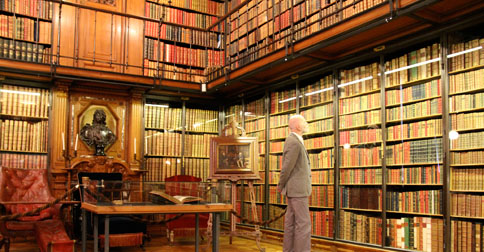Obtaining a Gentleman's Library, In Praise of Amazon

Image by Renaud Camus (CC BY-SA 2.0)
Before Amazon existed, acquiring a gentleman's library was an expensive and time consuming business. Now, with a second-hand book market that's international and price watch applications, it's easy, convenient, and cheap to build. Helping to democratise ownership of a large collection.
What is a gentleman's library? It used to be said that an English gentleman should have a personal collection of at least 10,000 books. The bare minimum an erudite sophisticate could own without feeling embarrassed and inadequate. Size matters.
Why 10,000 books? Isn't that too many? Those with a taste for literature and a thirst for knowledge will understand that it's not entirely implausible. It's certainly very easy for your collection to reach one or two thousand books without really noticing. And there are easily ten thousand books worth reading. Although, assuming you have fifty good reading years, you'd have to read two hundred a year. That's less likely.
I'm sure we can all agree that a modern day lady or gentleman should aim to read at least a thousand great works of fiction and non-fiction in a lifetime, while owning ten thousand is for the more ambitious. Incidentally if you don't agree with an aim to read one thousand great books in a lifetime, how many do you think an intelligent, modern person should aim to read?
Getting hold of books before Amazon wasn't so easy. In my small town there was a bookshop and you could go there and place an order for any book, and when it arrived at the store, you could pick it up there. In this sense, Amazon cut out the middleman. The customer can now make their own order from their home. The process is easier, Amazon usually has a lower price for new books, and they're delivered far more quickly, direct to your home.
But the true greatness of Amazon lies in the second-hand book market. The website allows anyone to sell books. There are a mixture of sellers: ordinary people, small book stores, and extremely large second-hand book stores. All of which are competing to offer you the best price. The large retailers tend to use a computer program to continually lower their book prices - a little bit at a time - to increase sales, often by being slightly cheaper than rival sellers.
The second-hand market is large - especially since it is also international, as here in the UK US companies compete with local businesses, driving down prices considerably.
This means that many serious, classic, or academic texts, which were often extremely expensive to buy, are now very cheap. Often texts that would have cost ┬Ż10, ┬Ż20, ┬Ż30, or more now cost a mere ┬Ż2.81 (that's ┬Ż0.01 with a ┬Ż2.80 delivery charge). That's a saving of 70% - 90%. This is great news for university students (especially if they don't mind previous editions, where savings are at their best) and it's great news for those who wish to own their own gentleman's library.
Ten thousand books at ┬Ż2.81 cost ┬Ż28,100, which is a great sum for most book lovers (┬Ż562 a year over 50 years). But it's much cheaper than buying new where ten thousand books may cost ┬Ż150,000 (┬Ż3,000 a year over 50 years, assuming an average price of ┬Ż15 a book).
The best way to get books at their cheapest like this is to use a price tracking app, such as Camelcamelcamel. Such an app can monitor the price of second-hand books and send you an email when the price has reached a favourable level, such as ┬Ż0.01.
These cost improvements mean a working person can far more easily afford a gentleman's library and a serious, book-led education. And it puts the ownership of a concise library of classics into the hands of even the poorest. A collection of one thousand books could cost ┬Ż2,810 (┬Ż56 a year, ┬Ż4.66 a month, over 50 years) compared with new at say ┬Ż15,000 (┬Ż300 a year, ┬Ż25 a month, over 50 years).
This only adds to the democratising effect of public libraries on education. A serious, book-led education is even more within the reach of the public than ever before. Amazon as an institution is to be commended for this. Now there's even less excuse for not being as well read as an enlightenment gentleman.